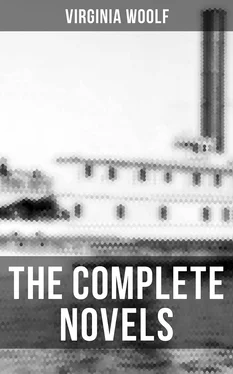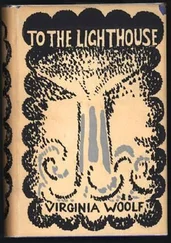Virginia Woolf - The Complete Novels of Virginia Woolf
Здесь есть возможность читать онлайн «Virginia Woolf - The Complete Novels of Virginia Woolf» — ознакомительный отрывок электронной книги совершенно бесплатно, а после прочтения отрывка купить полную версию. В некоторых случаях можно слушать аудио, скачать через торрент в формате fb2 и присутствует краткое содержание. Жанр: unrecognised, на английском языке. Описание произведения, (предисловие) а так же отзывы посетителей доступны на портале библиотеки ЛибКат.
- Название:The Complete Novels of Virginia Woolf
- Автор:
- Жанр:
- Год:неизвестен
- ISBN:нет данных
- Рейтинг книги:5 / 5. Голосов: 1
-
Избранное:Добавить в избранное
- Отзывы:
-
Ваша оценка:
- 100
- 1
- 2
- 3
- 4
- 5
The Complete Novels of Virginia Woolf: краткое содержание, описание и аннотация
Предлагаем к чтению аннотацию, описание, краткое содержание или предисловие (зависит от того, что написал сам автор книги «The Complete Novels of Virginia Woolf»). Если вы не нашли необходимую информацию о книге — напишите в комментариях, мы постараемся отыскать её.
Content:
The Voyage Out
Night and Day
Jacob's Room
Mrs Dalloway
To the Lighthouse
Orlando
The Waves
The Years
Between the Acts
Virginia Woolf (1882–1941) was an English writer, and one of the foremost modernists of the twentieth century. During the interwar period, Woolf was a significant figure in London literary society and a central figure in the influential Bloomsbury Group of intellectuals. Her most famous works include the novels Mrs Dalloway (1925), To the Lighthouse (1927) and Orlando (1928), and the book-length essay A Room of One's Own (1929), with its famous dictum, «A woman must have money and a room of her own if she is to write fiction.»
The Complete Novels of Virginia Woolf — читать онлайн ознакомительный отрывок
Ниже представлен текст книги, разбитый по страницам. Система сохранения места последней прочитанной страницы, позволяет с удобством читать онлайн бесплатно книгу «The Complete Novels of Virginia Woolf», без необходимости каждый раз заново искать на чём Вы остановились. Поставьте закладку, и сможете в любой момент перейти на страницу, на которой закончили чтение.
Интервал:
Закладка:
His determination to know, while it gave meaning to their talk, hampered her; he seemed to press further and further, and made it appear so important. She took some time to answer, and during that time she went over and over the course of her twenty-four years, lighting now on one point, now on another—on her aunts, her mother, her father, and at last her mind fixed upon her aunts and her father, and she tried to describe them as at this distance they appeared to her.
They were very much afraid of her father. He was a great dim force in the house, by means of which they held on to the great world which is represented every morning in the Times . But the real life of the house was something quite different from this. It went on independently of Mr. Vinrace, and tended to hide itself from him. He was good-humoured towards them, but contemptuous. She had always taken it for granted that his point of view was just, and founded upon an ideal scale of things where the life of one person was absolutely more important than the life of another, and that in that scale they were much less importance than he was. But did she really believe that? Hewet’s words made her think. She always submitted to her father, just as they did, but it was her aunts who influenced her really; her aunts who built up the fine, closely woven substance of their life at home. They were less splendid but more natural than her father was. All her rages had been against them; it was their world with its four meals, its punctuality, and servants on the stairs at half-past ten, that she examined so closely and wanted so vehemently to smash to atoms. Following these thoughts she looked up and said:
“And there’s a sort of beauty in it—there they are at Richmond at this very moment building things up. They’re all wrong, perhaps, but there’s a sort of beauty in it,” she repeated. “It’s so unconscious, so modest. And yet they feel things. They do mind if people die. Old spinsters are always doing things. I don’t quite know what they do. Only that was what I felt when I lived with them. It was very real.”
She reviewed their little journeys to and fro, to Walworth, to charwomen with bad legs, to meetings for this and that, their minute acts of charity and unselfishness which flowered punctually from a definite view of what they ought to do, their friendships, their tastes and habits; she saw all these things like grains of sand falling, falling through innumerable days, making an atmosphere and building up a solid mass, a background. Hewet observed her as she considered this.
“Were you happy?” he demanded.
Again she had become absorbed in something else, and he called her back to an unusually vivid consciousness of herself.
“I was both,” she replied. “I was happy and I was miserable. You’ve no conception what it’s like—to be a young woman.” She looked straight at him. “There are terrors and agonies,” she said, keeping her eye on him as if to detect the slightest hint of laughter.
“I can believe it,” he said. He returned her look with perfect sincerity.
“Women one sees in the streets,” she said.
“Prostitutes?”
“Men kissing one.”
He nodded his head.
“You were never told?”
She shook her head.
“And then,” she began and stopped. Here came in the great space of life into which no one had ever penetrated. All that she had been saying about her father and her aunts and walks in Richmond Park, and what they did from hour to hour, was merely on the surface. Hewet was watching her. Did he demand that she should describe that also? Why did he sit so near and keep his eye on her? Why did they not have done with this searching and agony? Why did they not kiss each other simply? She wished to kiss him. But all the time she went on spinning out words.
“A girl is more lonely than a boy. No one cares in the least what she does. Nothing’s expected of her. Unless one’s very pretty people don’t listen to what you say…. And that is what I like,” she added energetically, as if the memory were very happy. “I like walking in Richmond Park and singing to myself and knowing it doesn’t matter a damn to anybody. I like seeing things go on—as we saw you that night when you didn’t see us—I love the freedom of it—it’s like being the wind or the sea.” She turned with a curious fling of her hands and looked at the sea. It was still very blue, dancing away as far as the eye could reach, but the light on it was yellower, and the clouds were turning flamingo red.
A feeling of intense depression crossed Hewet’s mind as she spoke. It seemed plain that she would never care for one person rather than another; she was evidently quite indifferent to him; they seemed to come very near, and then they were as far apart as ever again; and her gesture as she turned away had been oddly beautiful.
“Nonsense,” he said abruptly. “You like people. You like admiration. Your real grudge against Hirst is that he doesn’t admire you.”
She made no answer for some time. Then she said:
“That’s probably true. Of course I like people—I like almost every one I’ve ever met.”
She turned her back on the sea and regarded Hewet with friendly if critical eyes. He was good-looking in the sense that he had always had a sufficiency of beef to eat and fresh air to breathe. His head was big; the eyes were also large; though generally vague they could be forcible; and the lips were sensitive. One might account him a man of considerable passion and fitful energy, likely to be at the mercy of moods which had little relation to facts; at once tolerant and fastidious. The breadth of his forehead showed capacity for thought. The interest with which Rachel looked at him was heard in her voice.
“What novels do you write?” she asked.
“I want to write a novel about Silence,” he said; “the things people don’t say. But the difficulty is immense.” He sighed. “However, you don’t care,” he continued. He looked at her almost severely. “Nobody cares. All you read a novel for is to see what sort of person the writer is, and, if you know him, which of his friends he’s put in. As for the novel itself, the whole conception, the way one’s seen the thing, felt about it, make it stand in relation to other things, not one in a million cares for that. And yet I sometimes wonder whether there’s anything else in the whole world worth doing. These other people,” he indicated the hotel, “are always wanting something they can’t get. But there’s an extraordinary satisfaction in writing, even in the attempt to write. What you said just now is true: one doesn’t want to be things; one wants merely to be allowed to see them.”
Some of the satisfaction of which he spoke came into his face as he gazed out to sea.
It was Rachel’s turn now to feel depressed. As he talked of writing he had become suddenly impersonal. He might never care for any one; all that desire to know her and get at her, which she had felt pressing on her almost painfully, had completely vanished.
“Are you a good writer?” she asked.
“Yes,” he said. “I’m not first-rate, of course; I’m good second-rate; about as good as Thackeray, I should say.”
Rachel was amazed. For one thing it amazed her to hear Thackeray called second-rate; and then she could not widen her point of view to believe that there could be great writers in existence at the present day, or if there were, that any one she knew could be a great writer, and his self-confidence astounded her, and he became more and more remote.
“My other novel,” Hewet continued, “is about a young man who is obsessed by an idea—the idea of being a gentleman. He manages to exist at Cambridge on a hundred pounds a year. He has a coat; it was once a very good coat. But the trousers—they’re not so good. Well, he goes up to London, gets into good society, owing to an early-morning adventure on the banks of the Serpentine. He is led into telling lies—my idea, you see, is to show the gradual corruption of the soul—calls himself the son of some great landed proprietor in Devonshire. Meanwhile the coat becomes older and older, and he hardly dares to wear the trousers. Can’t you imagine the wretched man, after some splendid evening of debauchery, contemplating these garments—hanging them over the end of the bed, arranging them now in full light, now in shade, and wondering whether they will survive him, or he will survive them? Thoughts of suicide cross his mind. He has a friend, too, a man who somehow subsists upon selling small birds, for which he sets traps in the fields near Uxbridge. They’re scholars, both of them. I know one or two wretched starving creatures like that who quote Aristotle at you over a fried herring and a pint of porter. Fashionable life, too, I have to represent at some length, in order to show my hero under all circumstances. Lady Theo Bingham Bingley, whose bay mare he had the good fortune to stop, is the daughter of a very fine old Tory peer. I’m going to describe the kind of parties I once went to—the fashionable intellectuals, you know, who like to have the latest book on their tables. They give parties, river parties, parties where you play games. There’s no difficulty in conceiving incidents; the difficulty is to put them into shape—not to get run away with, as Lady Theo was. It ended disastrously for her, poor woman, for the book, as I planned it, was going to end in profound and sordid respectability. Disowned by her father, she marries my hero, and they live in a snug little villa outside Croydon, in which town he is set up as a house agent. He never succeeds in becoming a real gentleman after all. That’s the interesting part of it. Does it seem to you the kind of book you’d like to read?” he enquired; “or perhaps you’d like my Stuart tragedy better,” he continued, without waiting for her to answer him. “My idea is that there’s a certain quality of beauty in the past, which the ordinary historical novelist completely ruins by his absurd conventions. The moon becomes the Regent of the Skies. People clap spurs to their horses, and so on. I’m going to treat people as though they were exactly the same as we are. The advantage is that, detached from modern conditions, one can make them more intense and more abstract then people who live as we do.”
Читать дальшеИнтервал:
Закладка:
Похожие книги на «The Complete Novels of Virginia Woolf»
Представляем Вашему вниманию похожие книги на «The Complete Novels of Virginia Woolf» списком для выбора. Мы отобрали схожую по названию и смыслу литературу в надежде предоставить читателям больше вариантов отыскать новые, интересные, ещё непрочитанные произведения.
Обсуждение, отзывы о книге «The Complete Novels of Virginia Woolf» и просто собственные мнения читателей. Оставьте ваши комментарии, напишите, что Вы думаете о произведении, его смысле или главных героях. Укажите что конкретно понравилось, а что нет, и почему Вы так считаете.












